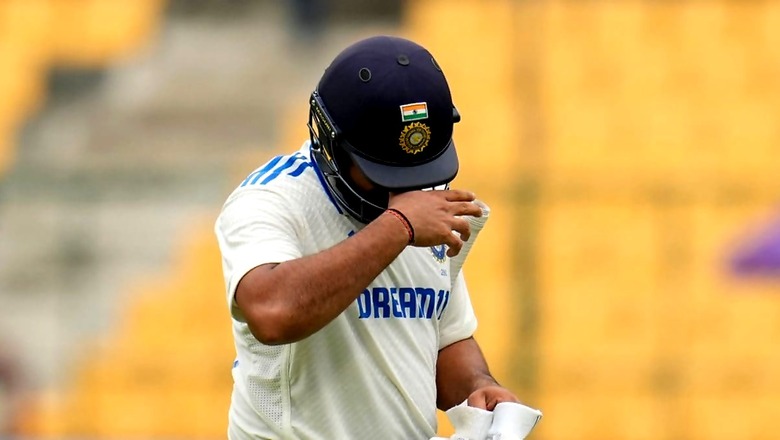
views
India skipper Rohit Sharma admitted he was “hurting” after his team crashed to its lowest-ever total of 46 at home on the second day of the opening Test against New Zealand at the M Chinnaswamy Stadium in Bengaluru on Thursday.
After Rohit opted to bat in overcast conditions, India’s innings folded in just 31.2 overs with five home batters not even managing to open their accounts.
India vs New Zealand: 1st Test, Day 2 – HIGHLIGHTS
“I am hurting a little bit because I made that call. We found ourselves in a situation where we got bowled out for 46 runs. As a captain, it definitely hurts to see that number,” said Rohit during the post-day press meet after New Zealand were comfortably placed at 180/3.
“So, clearly a misjudgement of the pitch. I did not read the pitch well enough and we sit in this situation. Though in 365 days, you will make two or three bad calls. That is absolutely fine, I guess,” he rued.
Rohit was equally candid to admit that his side did not respond to the challenge offered by the Kiwis pacers.
“The challenge that was thrown at us, we didn’t respond well. Sometimes you make the right call, sometimes you don’t. I was on the other side of it this time around,” he said.
“Today was a bad day for us. But we have played many such matches before. But we should challenge ourselves as much as we can,” he asserted.
So, what prompted him to take the decision of taking the first strike even after seeing a canopy of grey clouds hanging over the venue ahead of the toss?
“We felt there was no grass on the pitch. We thought it will do whatever it has to do in the first couple of sessions and then it is going to take turn,” he explained.
“Whenever we play in India, the first session is always critical and then the wicket tends to settle down and then the spinners come into play,” he said.
Rohit also detailed the rationale behind replacing pacer Akash Deep with left-arm wrist spinner Kuldeep Yadav despite the overcast conditions.
“As I said, there was not much grass (on pitch). So, the reason to add Kuldeep was because he is bold on flat pitches and he has taken wickets. So, we expected the pitch to be a little flatter than what it turned out to be,” he said.
India suffered a shocking batting collapse in Bengaluru, being bowled out for a mere 46 runs in 31.2 overs, marking their lowest total ever in 293 home Test matches. This 46 all-out was the first instance in which the team failed to cross the 50-run mark in a Test innings at home.
This abysmal performance was spearheaded by New Zealand’s relentless pace attack, which took full advantage of the overcast conditions to dismantle India’s lineup in stunning fashion. The collapse included five Indian batters departing without scoring, a rare and painful sight for the home crowd.
The total of 46 is now India’s lowest in a home Test, breaking a 37-year-old record. The previous lowest was 75 against the West Indies in 1987 in Delhi. The magnitude of Thursday’s failure was amplified by the fact that this was only the second instance in India’s history when five of their batters recorded ducks in a home Test innings — the first being in Mohali, also against New Zealand, in 1999.
This 46-run debacle was also the lowest total India had posted in any Test match since their infamous 36 all-out against Australia in Adelaide in 2020. That Adelaide collapse had sent shockwaves through Indian cricket, but Thursday’s implosion felt even more jarring, given the familiarity of home conditions. It was also the third time New Zealand had humiliated India with sub-100 scores, following similar low totals in Mohali (1999) and Mumbai (1965).
(With inputs from Agencies)


















Comments
0 comment